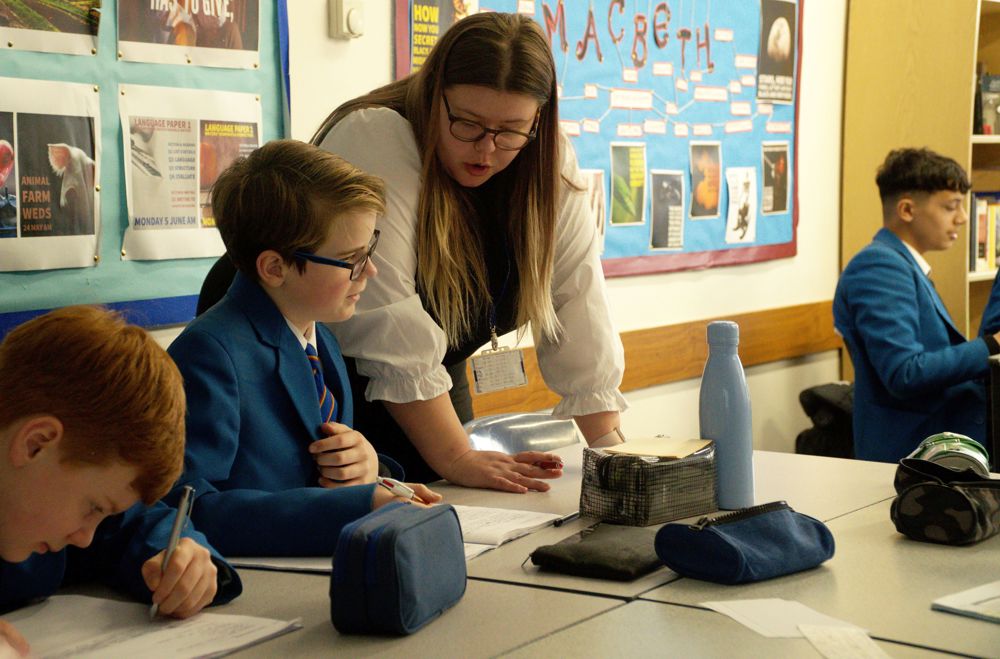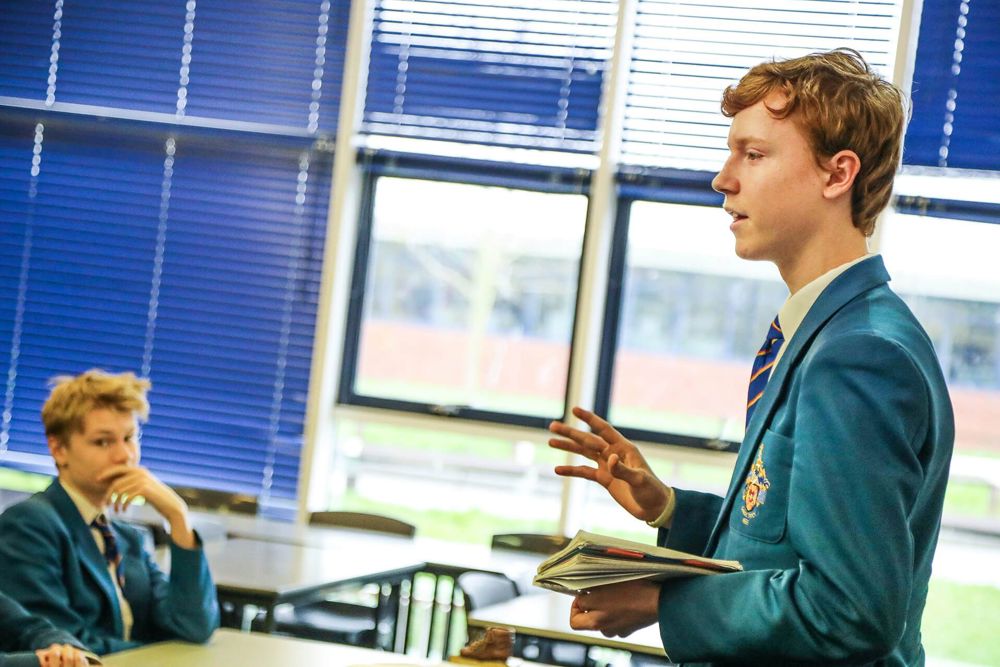
English
The English Department nurtures resilient, independent learners who think for themselves, challenge ideas and take risks.
Teachers aim to inspire and motivate students, fostering critical thinking and helping them to develop the confidence to form opinions and express their ideas articulately.
Learners read widely and are supported in reading for pleasure while being exposed to ambitious text choices with which they engage fully, exploring layers of meaning and inferring subtleties of language with creativity, curiosity and insight. Pupils go on to become creative and confident writers who express themselves clearly, with a deep understanding of the methods and structures writers utilise.
Curriculum Map

Key Stage 3
Pupils in Years 7 and 8 study English for six periods a fortnight and Year 9 for eight periods a fortnight. All pupils are taught in mixed-ability groups and can expect two homework tasks a week which may be in reading, writing, research, planning or responding to feedback. Pupils complete four formal assessments during each unit of work, each of which focuses on a different skill or aspect of content. Skills are revisited throughout the academic year to consolidate students’ learning and further develop their practices.
Year 7
Telling stories: Private Peaceful by Michael Morpurgo, Treasure Island by Robert Louis Stevenson, A Midsummer Night’s Dream by William Shakespeare.
Year 8
Power and conflict: The Woman in Black by Susan Hill, Voices of Protest (non-fiction texts), The Tempest by William Shakespeare.
Year 9
Identity and the individual in society: Of Mice and Men by John Steinbeck, Romeo and Juliet by William Shakespeare, The Hound of the Baskervilles by Sir Arthur Conan Doyle.
Useful Links

Key Stage 4
Pupils study the AQA Specification for English Language GCSE and English Literature GCSE. There are five English lessons each week with one top set and the remaining groups taught in mixed ability sets. Two homework tasks are set each week, one of which will usually be an extended writing task. Other tasks may include reading the set text independently to prepare questions for the next lesson, planning or drafting a response to a text, researching an area of context, or responding to feedback on assessed work.
For the examinations, GCSE students read one prose text, answer questions on the text and write imaginatively for English Language Paper 1. For Paper 2 pupils read two non-fiction texts and answer questions, and the writing section of this component requires writing for different purposes and audiences. English Literature Paper 1 focuses on Macbeth and The Strange Case of Dr Jekyll and Mr Hyde, and Paper 2 centres on Animal Farm and the AQA Poetry Anthology Love and Relationships cluster. Pupils are also asked to analyse and compare unseen poetry, plus they undertake a Spoken Language Endorsement, which is a separate accreditation and does not contribute to the GCSE grade.
Year 10
Animal Farm by George Orwell. The Strange Case of Dr Jekyll and Mr Hyde by Robert Louis Stevenson. English Language Paper 1 (fiction), reading and writing skills. English Language Paper 2 (non-fiction), reading and writing skills. AQA Poetry: Love and Relationships Anthology (cluster one), family poems. Aspects of Narrative (creative writing).
Year 11
Macbeth by William Shakespeare. AQA Poetry: Love and Relationships Anthology (cluster one), romance poems. English Language Paper 1, fiction skills. English Language Paper 2, non-fiction skills. Revision.

Key Stage 5
The entry requirement for A Level English is 12 points from English Language and Literature combined, with a minimum Grade 6 in Literature. Pupils study the Edexcel A Level English Literature Specification, which is taught in seven lessons each week with one substantial homework task every week. Tasks range from planning and writing essays, research and wider reading, reading texts set for study and working on presentations.
Pupils study one play by Shakespeare and one other from either tragedy or comedy, and critical essays related to the selected Shakespeare. A 2 hour 15 minute written drama exam comprises 30% of the A Level marks. Prose makes up 20% of the A Level and pupils study two texts linked by a chosen theme, with a 1 hour written exam. Poetry comprises 30% of the A Level with a selection of post-2000 works studied, plus a range of poems either from a literary period or by a named poet, with a 2 hour 15 minute written exam. The remaining 20% of marks is given over to coursework and pupils have a free choice of two texts which can be poetry, prose, drama or literary non-fiction. Assessment is by a 2,500-3,000 word essay.
Entry requirement
12 points from GCSE English Language and English Literature combined, with a minimum Grade 6 in English Literature.
Year 12
A Streetcar Named Desire by Tennessee Williams. Prose text study, women and society. Post-2000 poetry, poems of the decade.
Year 13
Twelfth Night by William Shakespeare. Poetry: Chaucer’s The Wife of Bath’s Prologue and Tale by Chaucer, the Romantic poets. Coursework: Comparison of two independently selected texts.
Enrichment
There are a number of activities and clubs through which students in all year groups can further develop their love for English and learn new skills. These include the regular House Speaking and House Writing competitions, the national Poetry by Heart competition for all Year 7 pupils, and Shakespeare Society trips to plays and festivals. Our guided reading programme takes place in tutor time for Years 7 to 10, with students reading and discussing a selection of classic and contemporary fiction across a range of genres throughout the year.
Head of English
Esme Cawley ehc@strs.org.uk